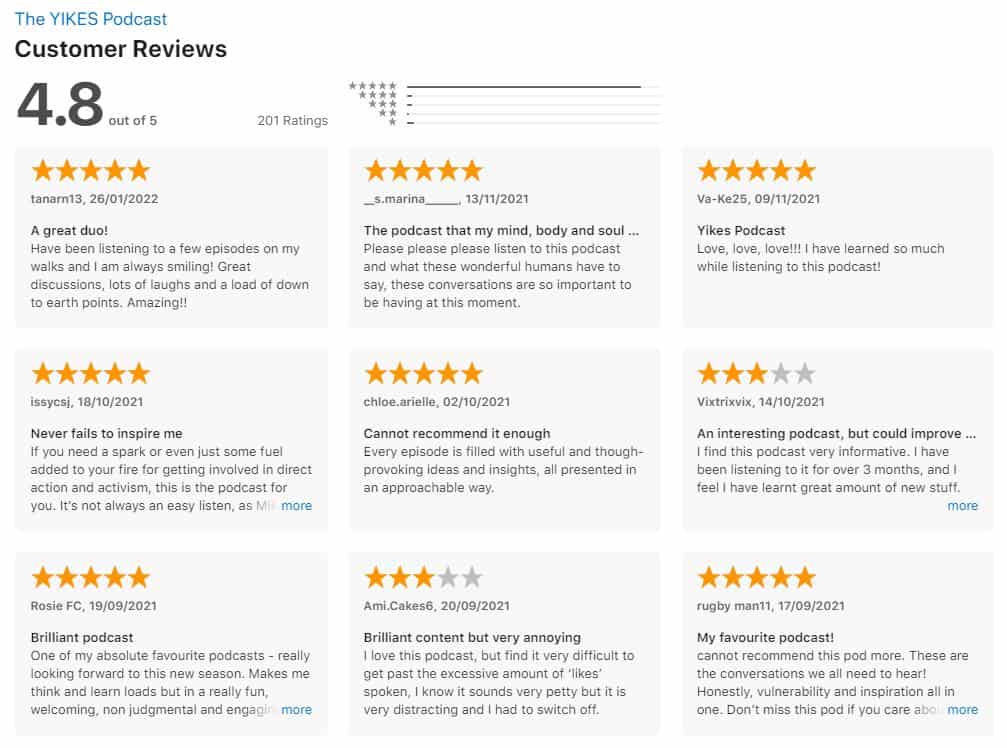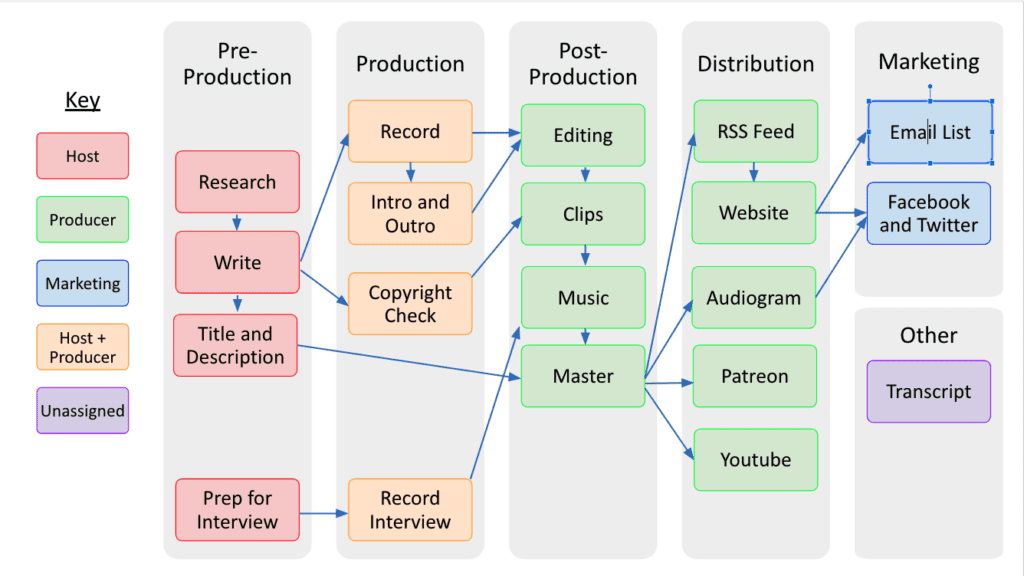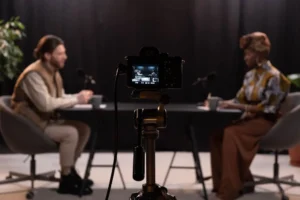In recent years, podcasting has become popular with all types of people. Covering everything from dream restaurant meals and business management tips to climate education and comedy, there’s something for everyone. With an estimated 104 million people listening to podcasts monthly in the US, it’s a great form of content to reach and engage with customers. Recording your own provides the chance to share expertise and retain the interest of your target audience.
However, starting a podcast is a lot of work and juggling promotion, content creation, and connecting with your audience can be difficult to do. Gaining popularity with your podcast can also take some work, requiring strategizing and understanding your audience. A way to streamline this process and help you achieve success is by using a virtual assistant.
Action
Read to start your own podcast? Learn the nitty-gritty details of starting your own show in our comprehensive guide. Learn how to start a podcast.
What is a Podcast Virtual Assistant?
Hosting and assembling a podcast can be hard work alongside the other administrative tasks involved. A podcast virtual assistant helps with this, allowing you to delegate aspects of running your podcast. It enables you to focus on the creative side and vision for your podcast. Virtual assistants may have particular expertise, such as previous editing experience or MLOps training, enabling them to improve your processes and the listening experience for your audience.
Depending on how much control you want and your abilities, podcast virtual assistants can take on many podcasting tasks. By arranging a schedule with the help of a weekly schedule template and contract with them, you can rely on their input into every weekly episode or annual series of your show. Different podcast virtual assistants will influence your podcast and how it comes across to your listeners, so it’s up to you to pick someone that aligns with your brand voice and understands your purpose.
How to Use Your Podcast Virtual Assistant
Writing
On your podcast, you may cover wide-ranging topics or interview various people, each needing thorough research and scriptwriting beforehand. Producing regular episodes on your own can be time-consuming and stressful. Outsourcing this to a podcast virtual assistant can draw on their knowledge of the subject area and use more in-depth research. It creates scripts filled with background knowledge and provides educated content to listeners.
Having a script also helps your podcast to run smoothly and reduces the time it takes for you to record. Although you may think discussions sound better unscripted, they can be more likely to follow tangents into irrelevant content to your podcast. By getting it right the first time, there’s less editing to be done or rerecording. Using a podcasting virtual assistant can help with this, even if their role is to provide an outline of the episode or key questions to ask throughout.
Editing
To make your episodes sound professional and engaging, it’s likely they’ll need some podcast editing. This may be adding an intro or outro, or background music, helping to create a brand voice for your podcast to make it easily recognizable. Alternatively, your podcast editing may be focused on keeping the episode to a certain length. These edits can improve the quality of your podcast for listeners, making them more likely to listen again.
When selecting a podcast virtual assistant to edit your episodes, ensure they have the software and equipment to do so to a high standard. This role does require technical knowledge, so it’s helpful to assess what your podcast virtual assistant can do before they start working on your episodes. Often, editors can send you a preview of the episode so you can review it and ensure it’s in keeping with your brand voice and engaging for your target audience.
Transcripts
To make your podcast more accessible to a broader audience, providing a transcript can be helpful. Particularly for those hard of hearing or non-fluent speakers of your language, having a written copy allows them to engage with your content. It improves your podcast SEO, making your website rank higher with search engines and attract more listeners. Having transcripts can grow your community, increasing your podcast popularity.
Writing transcripts can be easily forgotten when trying to meet podcast deadlines or on a tight schedule. Using a podcast virtual assistant ensures that every episode transcription is of a high standard, with someone specifically assigned to the task. If you have a global audience or listeners from particular countries, it may be worth hiring a transcriber who can also provide an accurate translation for those languages. This helps to expand your audience worldwide.
Spend time creating your podcast, not transcribing it. Every episode you publish on the Castos platform can be automatically transcribed into a full, word-for-word account of your episode. We’ve teamed up with the industry leading text-to-voice technology provider to offer an entirely seamless transcription experience that is available to all of our Castos hosting customers. Learn more about automatic podcast transcriptions .
Promotion
Sharing your podcast and promoting it online requires very different skills. It can include social media marketing for your podcast, sharing audio clips, sending podcast newsletters, or creating graphics. Promoting your podcast is crucial to making it stand out amongst the other podcasts covering similar topics and ideas. When executed appropriately, marketing attracts new listeners to the podcast while continuing to engage with your existing audience.
As promoting your podcast uses a new skill set, hiring a podcast virtual assistant with social media and marketing expertise can make a huge difference. By knowing which audiences engage best on various platforms, your virtual assistant can target ads and marketing through the channels that reach your target market. Likewise, they can create marketing materials that captivate, appealing to followers and reminding them to listen and engage with your podcast.
Guests
Whether your podcast is structured around guest appearances or you want to invite them occasionally, sourcing relevant and insightful guests take some pre-planning and communication. It includes considering whether you will be in a studio together or use business VoIP phones and record the call. Having guests on your show can help reach a wider audience by appealing to their fans and building up relations with your guest for future projects.
Experienced podcast virtual assistants may already have contacts of captivating guests, influencers, and experts in your subject area, making it easier to source and invite them onto your show. Alternatively, if you have guests in mind, you may want a virtual assistant to oversee communications, organise everyone, and follow up with the guest after recording. This improves the experience for your guest, making them more likely to recommend you to others.
Feedback
When working to boost your podcast’s profile, you should always improve and continually strive for a high standard of listener experience. By reading and responding to feedback from your audience, you can identify pain points and areas of the podcast to amplify and replicate. Feedback can be delivered through several channels, including social media comments, direct messages, and even your business’s virtual call center.
Monitoring all the channels feedback can come through can be a challenge, so using a podcast virtual assistant for this can help to keep track and respond to your listeners. This can be used to build relationships with your audience, recognize their value to your podcast, and improve their experience. Your virtual assistant’s replies should align with your brand voice, thanking listeners for their feedback. They can then highlight the most frequent feedback points to you.
Preparing for a Podcast Virtual Assistant
Once you’ve decided to hire a virtual assistant for your podcast, you need to be ready for them. They’re not going to be able to streamline your creation process if you’re still working out what you want them to do or how they fit into your podcast strategy. This preparation doesn’t have to take long. However, it does help you to know the sort of virtual assistant you will be seeking. With the following steps, you can ensure you’re ready to make the hire to benefit your podcast.
1. Set your podcast goals
Success for a podcast can come in many forms, so be specific about defining your goals. This could be audience-related, aiming to grow your podcast listeners, engage with them more, or reach a particular demographic. Alternatively, it could be more content-based surrounding the topics and subject areas you cover. Once these are defined, you can consider how a virtual assistant will work towards that goal and the support they can provide.
Also, remember to identify your key performance indicators and how you plan on measuring your success. Social media and podcasting platforms can provide listener and follower metrics, helping you quantify your podcast audience. Alternatively, if your podcast is part of your business marketing, you may be looking for sales or click-throughs to your ecommerce website. Without your KPIs, you can’t tell the impact of your virtual assistant on the podcast.
2. Outline your workflow
Your podcast workflow includes every stage from the preparation of each episode to the marketing and responding to feedback. Your workflow may not be the same as other podcasters due to your style, structure, and time. With this in mind, you can identify which stages you want more assistance with or want to invest in and improve. This may be to make the process smoother for you, better interact with listeners, or enhance the quality of the podcast.
Having a clear podcast workflow can also help virtual assistants to understand where their work comes in the process. This can lead to better communication and establishes expectations from the start, avoiding disappointments or confusion later on. If you work with a team or plan on hiring multiple podcast virtual assistants, this can highlight who is responsible for the various stages and needs to know about issues and delays.
3. Create a budget
Depending on various factors surrounding your podcast, the available budget to spend on hiring a podcast virtual assistant will differ. Podcast virtual assistants have different rates depending on their expertise, the work they perform, and how long you want them to assist on your podcast. Having a lower budget doesn’t mean there won’t be a virtual assistant available but may mean your options are limited to those with less experience or only for a shorter period.
Creating a budget ensures you aren’t wasting your time with virtual assistants with higher rates. Also, budgets help with prioritising, recognizing the most important areas of your podcast that need assistance, and focusing on finding someone to work on those. There are other podcast costs to consider too, before investing all you have in a virtual assistant. When working for a business, podcast costs may be part of the overall content marketing budget.
4. Identify areas to delegate
With the previous steps in place, it should become more apparent what you want your podcast virtual assistant to do and how they should be improving your podcast. Using this information, you can identify where a virtual assistant would be most effective and what areas of your podcast need the most attention. Likewise, information about your budget highlights how many tasks you can afford to outsource to virtual assistants and the level of insight you can expect them to have. In the process of hiring and the interview stage, it also helps to mention the role and workload to set expectations.
You can make the podcast production process smoother and improve the quality of your episodes by knowing which areas you plan on delegating to your virtual assistant. This makes it clear what responsibilities each person has. It also means listeners can have improved experiences when interacting with your podcast, making them listen more often, engage with your recommendations, and encourage others to start listening to your podcast too.
Streamline Your Podcast Creation with a Podcast Virtual Assistant
Constantly pushing for the success of your podcast alone can be tiring, using up the energy you need to make your podcast great. Hiring a podcast virtual assistant can help divide the workload and invite new expertise into your podcast-making process. Virtual assistants can take on a range of tasks needed to produce and share your podcast, leaving you to focus on content creation and connecting with your audience.
If you’re new to podcasting and unsure about using a podcast virtual assistant, start small and consider going on a course to learn how to. Even writing transcripts or managing social media messages can make your podcast more accessible and interactive for its listeners. Once you’re comfortable with others working on your podcast, you’ll feel more able to experiment with your virtual assistants, looking to their expertise and advice. This will help improve your creation process and boost your episode rankings.








Comments are closed.